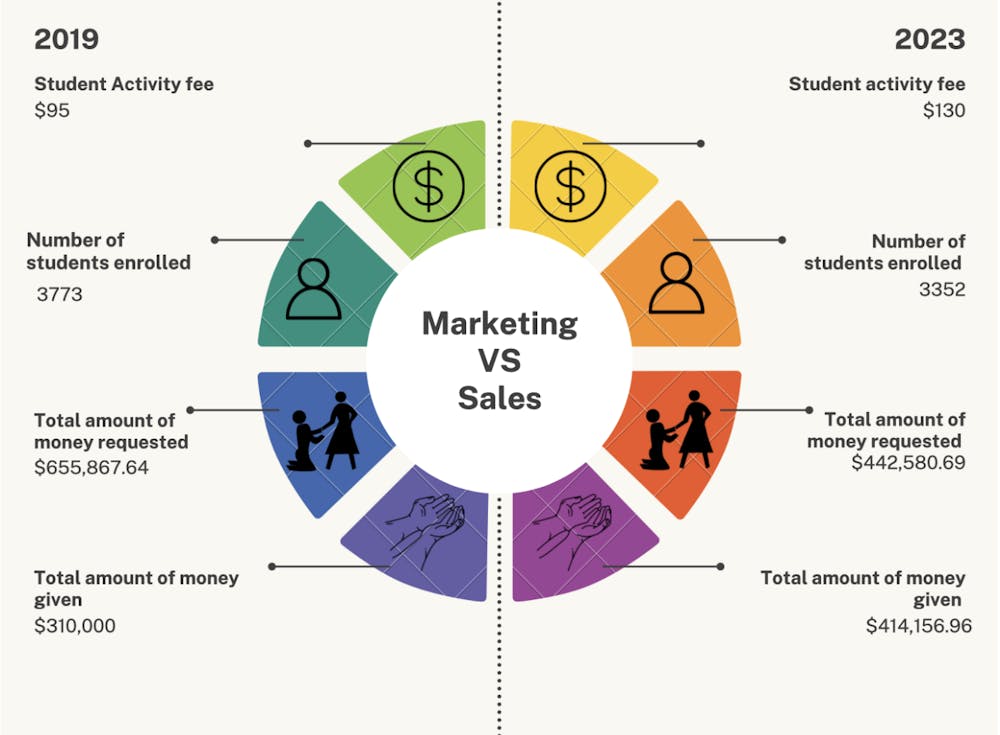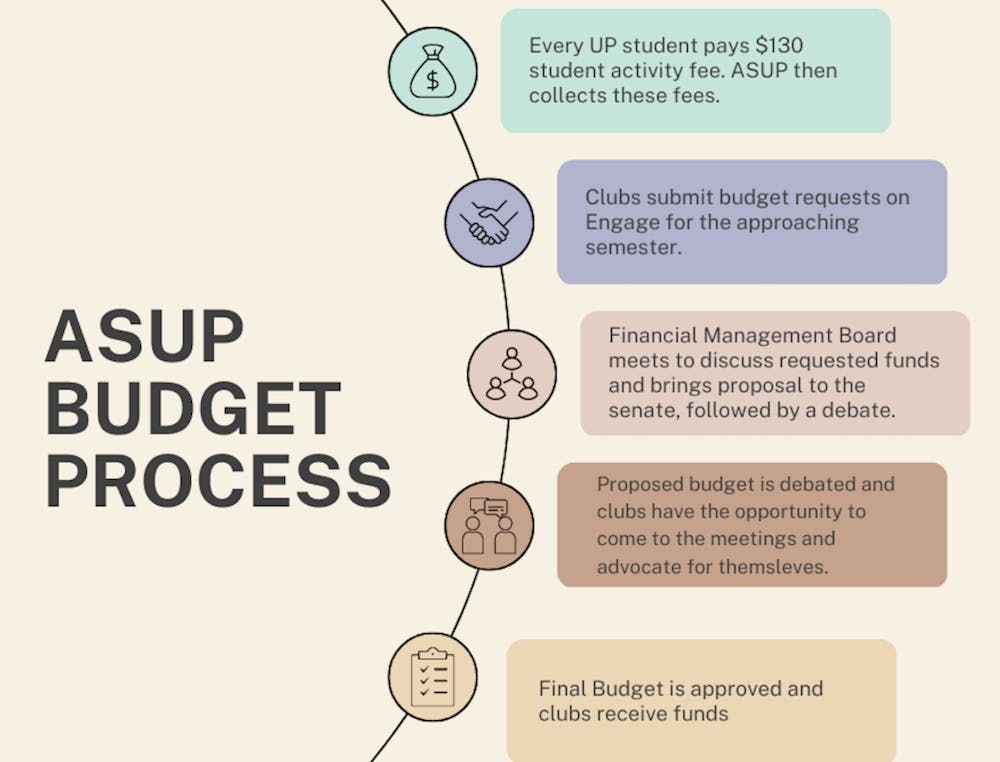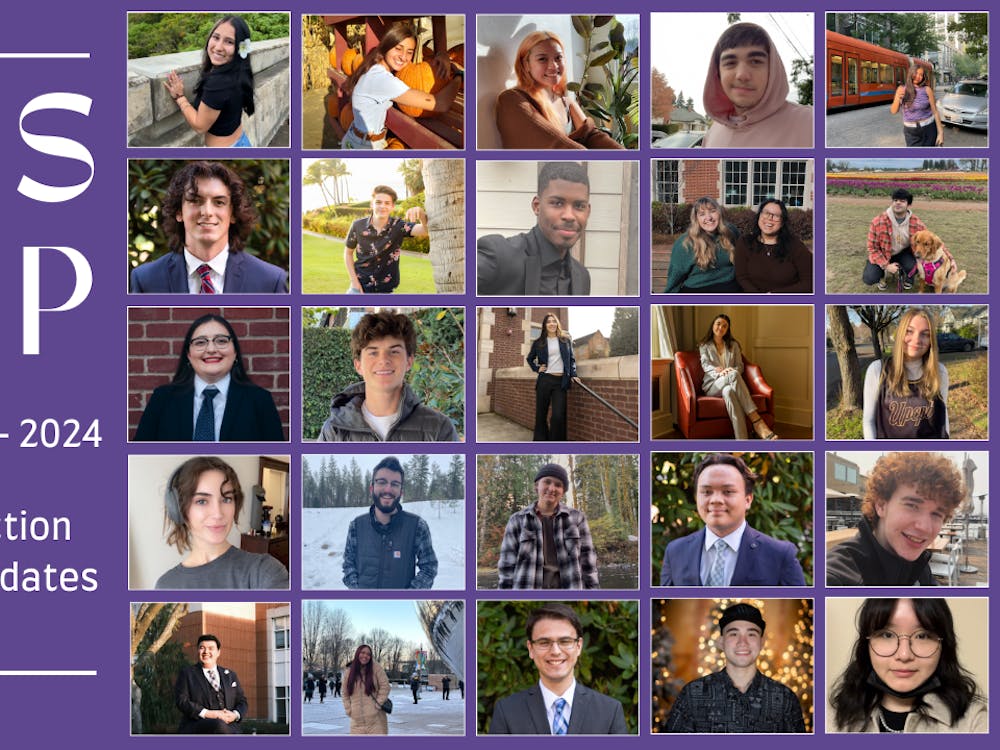Student activities are a large part of life on campus at The University of Portland. From events like Rock the Bluff to individual clubs, these activities bring students together to make UP a community. This year, with the impacts of the “freshman melt,” the Associated Students of University of Portland (ASUP) may not be able to provide clubs and student activities with the financial support they typically have.
The student activity fee comes out of tuition payments, so students may not see that this money funds something entirely different than room, board or normal tuition. The fee is currently $130 but an increase of $20 has recently been added to the ballot for this upcoming ASUP election. Clubs, CPB, ASUP and all the student-based activities operate because of this money.
“It's really important that the students who go to UP are represented in the budget that's created,” Graham Finch, ASUP director of finance, said.
A 20% decrease in expected students this year led to a decrease in student activity fees collected by ASUP that were then delegated to student activities at the University. This left many clubs and organizations feeling underfunded and worried about how to provide their members with the best opportunities.
However, the process to allocate and request funds through ASUP is intended to benefit students, freshmen melt or not, and there are certain endowments set in place to try and assist funds during financial straits.
How it works
After the student activity fee is collected from each student, ASUP uses these funds to distribute based on needs. ASUP uses a line item budget by beginning every semester with new funds. According to Jeromy Koffler, director of student activities, the budget is a value based system, rooted in the need to build community.
There is no club hierarchy at UP, meaning no club has more value than another. ASUP looks at every plan that students propose for clubs and thoroughly reviews it to see if the requests are reasonable and can be fairly aided.
However, clubs and organizations often miss out on receiving funds due to a lack of clear explanation on how to put in a request. Members of ASUP do their best to reach out to clubs, but with the large number of clubs at UP some are left without much direction.
Requests are submitted by every club through Engage which kicks off the review process with the Financial Management Board (FMB).
The FMB is led by Finch alongside 4-6 students from ASUP who work together to finalize the budget and present it to the rest of the ASUP staff. The spring 2023 board includes Amber Shen, Ronit Chopra, Aidan Sanchez, William Heyler, Megan Meckey and Dominic Phan.
These students are responsible for reviewing all requests by comparing them up to the standards — a list of precedents that are set for the FMB to follow in order to allocate funds in a fair and just manner.
Clubs are also encouraged to meet with the FMB during this review process in order to further explain their needs and vouch for their clubs success. After the FMB considers these requests and conducts interviews they are able to cut and balance the budget.
This proposed version of the budget is brought to the senate and debated. Clubs are encouraged to come to ASUP meetings in order to bring more perspective on why the chosen amount should be granted to them. Senators are responsible to make an effort during this time to reach out to clubs and provide opportunities for them to advocate for their funds.
Once the debate process is over and clubs state their case, the budget is approved.
“Almost every year we have a lot more requests than we have funds available," Koffler said. “And almost every year there are really tough decisions that the Senate has to make in order to pare down the budget to a reasonable and balanced state so that they can actually get it passed.”
The ramifications of Freshman melt
With the Freshmen melt there are fewer students than are typically enrolled at UP, meaning not as many student activities fees are being collected. Additionally, increasing travel fees and inflation impacts what the ASUP club budget can do.
These factors call for budget cuts and changing costs across the board. The student body has already felt these impacts with the rise in tuition, the shifting of the Title IX team and mandatory two-year residency. Club members may also be feeling these impacts despite ASUPs efforts to provide financial support.

According to the US inflation calculator in 2019 the US was at a 2.3% inflation rate. In 2023, we are now at a 6.4% inflation rate. This heavily impacts the price of airline tickets, hotel rooms, and food.
2019 was the last year ASUP released a budget prior to the COVID-19 pandemic. At the time the student activity fee was $95, but with a larger student body than we currently have. The $130 fee was proposed and voted on in 2019, yet came into fruition in 2021 following the pandemic.
Due to the increased student activities fee and funds taken out of the quasi endowment, ASUP asserts that it has not heavily felt the impacts of freshmen melt while making this semester's budget.
“I would say Freshman Melt impacted more of the overall UP budget as opposed to the ASUP budget,” Finch said.
The quasi-endowment is a fund made up of the leftover money ASUP did not spend during the previous semester. This endowment then builds interest which is put back into the budget fund. This was put in place for economically challenging years, like 2022-2023.
Unfortunately with such high inflation rates this year clubs are still facing difficulty purchasing plane tickets and hotel rooms. According to UP Mock Trial President Amelia Christensen and Treasurer Maeve Mahoney, club funding can make or break the club's ultimate success.
“I think everyone's in a tough place this semester,” Christensen said. “Unfortunately it does end up being prohibitive because we're a large club and we frequently travel. So those budget cuts can be pretty deleterious to our club's success.”
From ASUP’s perspective they are working their hardest to provide clubs with the budget they need to be as successful as possible. They understand the difficult position that clubs are put in this year and encourage them to apply for the Opportunity Grant if something arises that there is a lack of funds for.
“This may be challenging for some people to see,” Koffler said. “Funding levels change, but on the other hand, it's also a really important time to reevaluate our priorities and, you know, put our money where our values are.”
Netty Jurriaans is a reporter for The Beacon. She can be reached at jurriaan25@up.edu.









